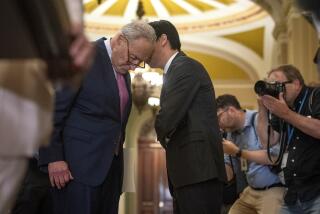Dug in on Iraq
THE TRAGEDY in the escalating confrontation between President Bush and the Democratic Congress over Iraq is that each has something the other needs.
Bush has the authority to engineer a change of direction in the war. But he lacks the credibility with the public to reestablish consent for his course.
Congressional Democrats, even after their seismic Senate victory Tuesday, ultimately lack the leverage to mandate a new course in Iraq. But they offer Bush his only possibility of rebuilding a public consensus over America’s role in the war.
Because neither side can set a sustainable course on its own, their choice is either to continue colliding in polarized confrontations like Tuesday’s Senate vote narrowly approving a time limit for withdrawal, or to seek agreement on a strategy for Iraq that a broader coalition in Congress and the country might support.
While Senate Majority Leader Harry Reid (D-Nev.) called Tuesday for such negotiations, Bush is approaching this intensifying debate with what appears to be utter denial about his political situation.
In Gallup polls, Bush’s approval rating has languished below 40% for most of the last year, a record of futility unmatched by any president since Jimmy Carter in 1980. In a Gallup survey released Tuesday, just 28% of Americans said they approved of Bush’s handling of the war. In that same poll, three-fifths of Americans said Congress should approve a timetable mandating the withdrawal of all troops from Iraq by fall 2008, a finding echoed in another national survey released Monday. In a country so closely divided between the parties, that’s about as close to a national consensus as we get.
In that climate, it’s delusional for the White House to imagine that it can restore public support for its Iraq plans without validation from the Democratic Congress. Yet Bush, in a second flight of fancy, appears convinced that he can still impose his will on Congress through sheer resolve, even though Democrats control both chambers.
Increasingly, the White House is demonstrating not only defiance but disdain in its dealings with Congress. On Iraq, Bush has rejected any role for Congress other than approving his demands for more funding. He’s been equally confrontational in ignoring the ample precedent of public congressional testimony by White House aides and insisting that his advisors will provide only unsworn, untranscribed, private testimony on the U.S. attorneys controversy.
On both fronts, Bush has approached Congress with the attitude of a teacher determined to discipline unruly kindergarteners, not as the head of a co-equal branch of government. The White House last week asserted that Congress has no oversight authority over the executive branch. Dan Bartlett, the White House counselor, declared that Bush would not negotiate over testimony on the U.S. attorneys issue with “members of Congress who seem intent on having a political trial.” As far as legal scholars can tell, the Constitution does not limit congressional authority “to make all laws which shall be necessary and proper” solely to those members whose motives the president considers pure.
Tuesday’s dramatic Senate vote on Iraq may have finally sent the message to Bush that he cannot deal with congressional Democrats solely on his terms. But congressional Democrats cannot force Bush to accept their terms either, even though both chambers have attached a 2008 troop-withdrawal requirement to the legislation funding the war. Bush has indicated that he will veto any mandated withdrawal, and the past week’s votes show that House and Senate Democrats are far from the two-thirds support they would need to override him.
The two sides thus appear on track for a standoff reminiscent of the 1995 government shutdown, with Bush demanding the money for Iraq and Democrats agreeing to provide it only if he commits to ending the American mission. And even that may be only the next round in a lengthy struggle that will continue with the debate over funding the Defense Department for 2008.
Such sustained conflict over Iraq could endanger congressional Republicans in 2008 by lashing them ever more tightly to an unpopular president and war. But this road is perilous for Democrats too. Although public opinion has turned decisively against the war, Congress’ job approval rating already is falling amid the sharpening conflict with Bush on Iraq and other fronts.
A negotiated legislative agreement that links a trial for Bush’s troop surge (which is showing some promise) with a concrete agreement from the administration to begin withdrawing forces if the strategy doesn’t produce substantial, tangible progress in a reasonable period might serve the political interests of both parties. More important, if American leaders can resolve their differences to set a common course on the war, it would increase the pressure on Iraqi leaders to do the same.
*
More to Read
Sign up for Essential California
The most important California stories and recommendations in your inbox every morning.
You may occasionally receive promotional content from the Los Angeles Times.










